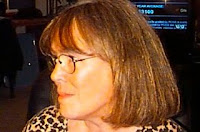Icy Snow Blackstone is my guest author today. Icy, please give us a brief bio.
First of all, thanks for letting me do this blog. I appreciate it. Now, to the bio! I’m a Southerner by birth although I’ve lived in various parts of the US, including the Midwest and Orange County, California. I graduated from a well-known Southern Baptist university with a degree in Fine Art and have another in Illustrative Art. I also have a son who’s a teacher and a granddaughter and grandson, ages eight and sixteen, respectively.
When did the writing bug bite, and in what genre(s)?
I started writing when I began first grade and have been penning various fictions ever since but I didn’t begin writing seriously until 1989.
When you started writing, what goals did you want to accomplish? Is there a message you want readers to grasp?
My reasons for writing are pretty selfish, I suppose. I just wanted to tell a story, many stories, in fact. All those that were circulating inside my head and just absolutely had to come out. So I started writing them down—first by hand, then typewriter, and finally on computer. I never really intended to have any published; they were just for me and a few others to read and enjoy.
Briefly tell us about your latest book. Series or stand-alone?
My latest book is called Brother Devil. About 20 years ago, I wrote a story called Bargain with Lucifer and sent it to a cousin to read. This novel was a romance, and in it, two brothers—Luc and Michel--were featured. After she read it, she said to me, “I’ve only got one question: What happened to Michel?” Bargain with Lucifer was supposed to be a one-shot, stand-alone novel but then I had to write Brother Devil to tell Michel’s story.
What’s the hook ?
Here’s the blurb to describe the story: The women of Orleans parish may have called Luc a devil and Michel an angel but now the angel is falling fast—and he’s enjoying his downward flight to the limit.
Brother Devil opens with a funeral, a funeral in which only the husband of the deceased is truly mourning. In spite of the things his dead wife did to him and his family, Michel Deveraux still loves her and tries to deny how completely cruel she was. It takes some very strong convincing from his family to make Michel admit Clarice’s manipulations but once he dies and realizes he’s no longer bound by marriage vows, he decides to make up for lost time. Michel had always been second to his big brother in everything, from his grandfather’s love to excelling in sports, and now, being successful with women is high in the list of categories. Before he knows it, he’s involved in a scandal and finding his life in danger as he goes after the one woman in Orleans parish whose brothers won’t accept a Deveraux “trifling” with their baby sister.
How do you develop characters? Setting?
In this book, the characters were more or less already set since they’d been in a previous novel. It was simply a matter of tempering them over time (the story covers 3 years), showing how the events in the first novel caused what happened in the second and how they all reacted to it. The fact that they are Southerners and Creoles also influences their reactions to events differently from how people in another part of the country would act.
Do you have specific techniques you use to develop the plot and stay on track?
I imagine my techniques are the worst imaginable! I just sit down and start typing. Very linear. Beginning to end. Afterward, I may decide that something in the middle of the book would be more appropriate at the end or closer to the beginning, or that I should actually start the story in the present or after a certain event and then flashback or forward. I actually used to print out pages and cut them up and repaste them together into how I thought they should be. I still do that but now, I “cut and paste” on the computer.
Every time I start a new chapter, I go back and read the one I just finished, edit it, and then go on. That helps me keep continuity.
How does your environment/upbringing color your writing?
I set a lot of my romances in the South and goodness knows, that’s a place which has a great influence on what my characters do. It also helps if your editor knows something about the setting of your novels. I had one editor who was from Tasmania and admitted she knew nothing about Southerners. We went back and forth over a few things in the novel because she was looking at them from an Australian/United Kingdom point of view, and I was seeing them from the US/Southern viewpoint.
What are your current projects?
I have a couple of fantasy romances I’m tossing around. One is The King’s Swordswoman, about a woman warrior hired to protect a king’s invalid son and what happens when she believes the boy is killed while on her watch. Of course, he isn’t and many years later they meet; he knows who she is but she doesn’t recognize him. It’s a love story, so of course there’s going to be plenty of intrigue and heartbreak before the HEA.
Where can folks learn more about your books and events?
I have a website: http://www.icysnowblackstone.com/, Facebook and My Space pages, and a page at Author’s Central on amazon.com’s website. I also blog regularly at the Pink Fuzzy Slippers blogsite.














